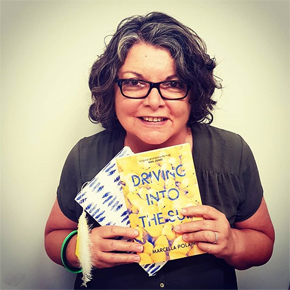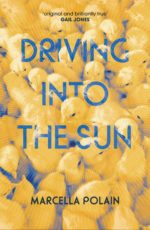Award-winning author Marcella Polain on playing the long game when it comes to writing

Ever felt like your writing project is taking a little too much time? Fremantle Press author Marcella Polain’s new novel, Driving into the Sun, was 10 years in the making. Here, she offers tips and advice to new and emerging writers about taking your time, maintaining momentum and what writer’s block is really all about.
Why did you spend so long working on Driving into the Sun?
Several reasons. Firstly, because I write quite slowly, paying very close attention to every word. For me it’s not just about meaning but also sound and metre, each moment’s emotional truth. All this has to be right before I move on to the next sentence. If I get 300 good words written in a day’s work, I’m happy. I also have a very demanding job in the writing program at ECU, which I love, but it doesn’t leave much for anything else, and I also work as a poetry mentor and editor, which is extremely rewarding but also demanding. Finally, I live with chronic illnesses, which means my physical resources are limited and need to be carefully portioned.
When I sit back and consider all of the above, it’s a miracle that Driving into the Sun didn’t take even longer!
What advice would you offer to a writer who feels like their project is taking too long?
Large writing projects are not sprints, they’re marathons. Employ the tactics of the distance runner: set yourself small goals; think about how far you have come; find and keep returning to the calm centre of the work, the thing you really want to say that’s driving the whole project. Don’t look too far ahead, and let go of the idea that it must be finished by a certain time.
I don’t mean you have to write it linearly. You can write in fragments, in a mosaic manner, writing whichever scene presents itself to you. Eventually you will have enough fragments that a larger picture will emerge. Faith is hard to sustain but you must sustain it – in yourself and in the project.
How do you keep up the momentum when it’s taking a long time?
I try to follow my own advice! I’m much more interested in quality than quantity, so I keep remembering that one strong work is worth more than any number of ordinary ones. Think about it this way: published writing goes out into the world forever. It’s our legacy as writers so it deserves the time it needs to be the best we can make it.
Was there ever a point in the process of writing Driving into the Sun where you felt like giving up and moving on to something else?
I don’t give up. I can only recall setting aside one project, an original screenplay, and even then I handed it on to someone else. I’m not sure why I don’t give up, perhaps because I choose projects that matter a great deal to me, stories that come from my core. I’ve always felt that writing chose me, rather than me choosing it, and maybe this is just an extension of that. It takes hold of me and won’t let me go.
Did anything change drastically (characters, plot, setting) between starting to write and finishing the novel?
Only the ending. It gave me a lot of trouble and I have several versions, which is probably because I write without a plan. Mostly, I write a sentence and then interrogate that sentence for the next possible sentence. One thing that did happen with Driving into the Sun is that the story came to life in a surprising way when I went back and developed Deebee’s character, made her more active. New narrative possibilities opened.
Do you think there is a pressure on writers currently to focus on speed rather than quality?
Oh, yes. We’re living in a time that’s obsessed with the next big thing, celebrity, a 24/7 news cycle and what’s trending on social media. It’s almost all superficial, repetitive and inane. Writers are not immune from these pressures – we can’t be. Historically, taking a decade to write a novel is not unusual. Yet my taking that long to make Driving into the Sun is remarked upon all the time. I strongly believe we need to resist the expectation that we can just pull quality writing (or any art) out of our ear by a date decided upon by commercial considerations. Working in this way would destroy my writing voice, and I’m alarmed when I see young writers under this kind of pressure.
I understand the desire to be published but it’s important to remember that if the work is good enough it will find publication without us being bullied in this way. The current commercial world too often treats people, its artists, as commodities and I think we need to push back and remember that they can’t exist without what we make.
Do you ever get writer’s block? If so, what’s your tip for releasing yourself?
I don’t believe in writer’s block. I think instead it’s a sign that something’s wrong, that we need to process something – something about the subject we’re writing about, perhaps – or change our life in some way. Maybe get out of a relationship that’s undermining us. It’s a psychological signal. There have been times I couldn’t write, yes, but they have always been about something else, not about the writing.
How did it feel to see the finished version of your book?
Oh, it’s terrifying. I had such a strange relationship with this manuscript. I lived with it a long time. And long before that, I knew I would write about the inner lives of children, their capacity for love and grief, and what happens to families when the man is suddenly gone. This novel has been in me for half a century; no wonder it was terrifying to see it as a finished book.
Do you have a particular spot where you go to write?
No. I write anywhere. In the car waiting for my kids, in the classroom, curled up on the sofa, at the beach, in bed in the middle of the night when I can’t sleep. I’m really curious about writers who have special places to write in, dedicated rooms they sometimes fiercely protect. To me, one of the best things about writing is that the practice is so self-contained. All you need is pen and paper (or keyboard and hard drive). The practice doesn’t depend on a room or on anybody else. I learned early that, because of this, no-one could stop me and I could just keep doing it in the spaces between all the other things I had to do, no matter what else happened in my life. You can do a lot of thinking about writing as you push the trolley along the supermarket aisles, and you can write during the half hour of the kids’ swimming lessons. It’s amazing how much accrues this way.
Finish the following sentence: ‘When I’m not writing you’ll find me …’
When I’m not writing you’ll find me teaching or supervising or editing or mentoring or administrating. That’s if I’m working on a writing project. If I’m not working on a project, I like to spend that time at the beach or in my garden. Out in the sun.



